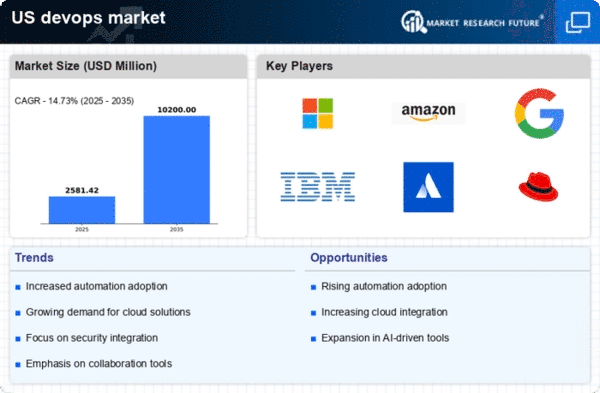Emphasis on Continuous Delivery
Continuous delivery is becoming a cornerstone of the devops market, as organizations strive to deliver software updates more frequently and reliably. This approach allows for rapid deployment of new features and bug fixes, which is essential in today’s fast-paced digital environment. A survey indicates that 75% of companies in the US are implementing continuous delivery practices to improve their software release cycles. The devops market is responding to this demand by providing tools and frameworks that support continuous integration and delivery pipelines. As businesses recognize the value of continuous delivery in enhancing customer satisfaction and reducing time-to-market, the devops market is likely to witness sustained growth in this area.
Growing Focus on Cloud Computing
The shift towards cloud computing is significantly impacting the devops market. As organizations increasingly migrate their operations to the cloud, the demand for devops practices that support cloud-native development is on the rise. This transition is evidenced by a 60% increase in cloud adoption among US enterprises over the past two years. The devops market is adapting to this trend by offering solutions that facilitate seamless integration with cloud platforms, enabling faster deployment and scalability. The growing reliance on cloud infrastructure is expected to drive innovation within the devops market, as companies seek to leverage the benefits of cloud computing to enhance their software development processes.
Rising Demand for Agile Development
The devops market is experiencing a notable shift towards agile development methodologies. Organizations are increasingly adopting agile practices to enhance their software development processes, which allows for quicker iterations and improved responsiveness to market changes. This trend is driven by the need for faster delivery of software products, with a reported 70% of companies in the US indicating that agile practices have significantly improved their project outcomes. As a result, the devops market is likely to see a surge in tools and services that facilitate agile development, including continuous integration and continuous deployment (CI/CD) solutions. The emphasis on agility is expected to propel the growth of the devops market, as businesses seek to remain competitive in a rapidly evolving technological landscape.
Integration of Artificial Intelligence
The integration of artificial intelligence (AI) into the devops market is becoming increasingly prevalent. AI technologies are being utilized to automate various aspects of the software development lifecycle, including testing, monitoring, and incident response. This integration is projected to enhance efficiency and reduce the time required for software delivery. According to recent estimates, the AI-driven devops market could reach a valuation of $10 billion by 2026, reflecting a compound annual growth rate (CAGR) of approximately 25%. The potential for AI to analyze vast amounts of data and provide actionable insights is likely to drive further adoption of AI tools within the devops market, enabling organizations to optimize their operations and improve overall performance.
Increased Regulatory Compliance Requirements
The devops market is also being shaped by the increasing regulatory compliance requirements across various industries. Organizations are under pressure to adhere to stringent regulations regarding data security and privacy, which necessitates the integration of compliance measures into their software development processes. This trend is particularly evident in sectors such as finance and healthcare, where compliance is critical. As a result, the devops market is seeing a rise in demand for solutions that facilitate compliance automation and reporting. Companies are investing in tools that ensure their devops practices align with regulatory standards, thereby mitigating risks and enhancing their overall security posture. This focus on compliance is expected to drive innovation and growth within the devops market.

















